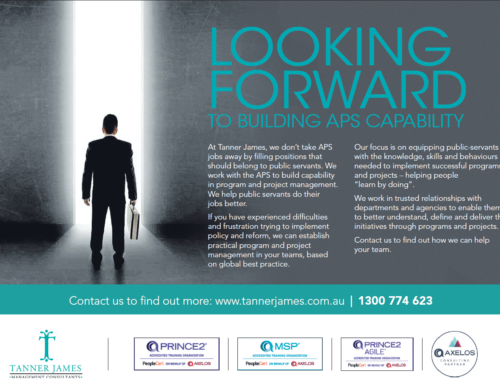Here are three typical responses to the question “where are you with programme and project management?”:
- All our project managers are (say) PRINCE2®-qualified and we have a full set of templates on the intranet that they have to fill in.
- We’re given much theory and not enough about how to really do it. The exams are just a memory test. Our templates are painful.
- It doesn’t really matter which framework you choose as long as you have one. We have Steering Committees, but there’s too much paperwork and I don’t have the time to spend on that stuff. I’m more interested in getting on with things and making sure we deliver.
The responses reflect three different roles, each with their own perspective – the PMO, the project manager and an SES officer. All three are doing their very best to get the job done. All three face challenges in the domain of programme and/or project management, and many express some degree of frustration with the other two roles.
In this blog and future blogs I will work through some of the challenges and frustrations that give rise to these responses, and in doing so look at what can be done to address them…
“PRINCE2-qualified”
This is one of the most commonly-used phrases I have heard over the years. But what does it actually mean? And does it matter?
There are two levels of qualification right? Wrong. I can think of at least ten:
- PRINCE2 Foundation (pre-2009).
- PRINCE2 Foundation (post 2009).
- PRINCE2 Practitioner (pre 2009).
- PRINCE2 Practitioner (post 2009).
- PRINCE2 Registered Practitioner.
- PRINCE2 Professional.
- Certificate IV in Project Management (attained based on PRINCE2).
- Diploma of Project Management (attained based on PRINCE2).
- PRINCE2 Trainer.
- PRINCE2 Consultant.
So the next time someone says to you “I’m PRINCE2-qualified”, it’s worth thinking about what that actually means, in the sense of whether the person holds the appropriate qualification for what they are expected to do.
Of course, having a qualification is one thing, but having the knowledge and experience required to competently perform a role is another.
The qualification system for AXELOS® frameworks is based upon a variant of Bloom’s Taxonomy of Educational Objectives. This classifies learning objectives into six ascending learning levels, each defining a higher degree of competencies and skills. These are summarised – roughly – below:
Level 1 – Knowledge (information)
Know key facts, terms and concepts from the guidance – hence the “memory test” criticism.
Level 2 – Comprehension (understanding)
Understand – as opposed to simply being able to recall – key concepts from the guidance.
Level 3 – Application (using)
Be able to apply key concepts for a given scenario. To me this is the level at which the learning starts to become useful for an agency – because you can now apply your knowledge.
Level 4 – Analysis (using)
Be able to identify, analyse and distinguish between appropriate and inappropriate use of the guidance for a given scenario. Or to put it another way “be able to tailor effectively”.
At the risk of offending my audience, I think this should be the “minimum standard” for all PMO staff who support frameworks – and for the key one or two SES officers directly above them in the hierarchy.
Level 5 – Professional Practice (creating and justifying)
Be able to develop, evaluate and propose options for tailored approaches, designs or structures and justifying the value of those approaches.
For those who know the AXELOS exams, levels 1 and 2 are used for the Foundation exams and levels 2 to 4 are used for Practitioner exams.
So does it matter? In my opinion, yes, it does. Because to be blunt, passing the PRINCE2 Foundation exam does not in itself qualify you to manage a project being run using PRINCE2 (sorry). Yet plenty of people – among them some well-paid contractors – describe themselves as “PRINCE2-qualified” when what they mean is they have (only) passed the PRINCE2 Foundation exam. Is that to say they are not qualified to manage a project? Not necessarily, but I’d look for some other evidence – a competency-based qualification (e.g. a Diploma) attained through assessment and/or a professional status attained the same way.
So must everyone have a qualification?
In my opinion, the answer is definitely not. This answer might surprise you, given the amount of time I’ve spent unpacking the qualifications system. I think levels 3-5 above are a useful reference point, but I’m not advocating that everyone involved with a programme or project should take an exam to achieve those levels of learning. For example, it would be inappropriate for an SES officer appointed as a Project Board Executive to spend five days on a PRINCE2 Practitioner course. They need an understanding of PRINCE2 that is specific to their role, and that is not necessarily something that can be achieved in a classroom – which highlights a topic I will address in a forthcoming blog: workplace learning.
In the meantime, if you have any questions about MSP®, PRINCE2 or other AXELOS qualifications, please give us a call on 1300-774 623 or drop me a line at john.howarth@tannerjames.com.au.






Leave A Comment